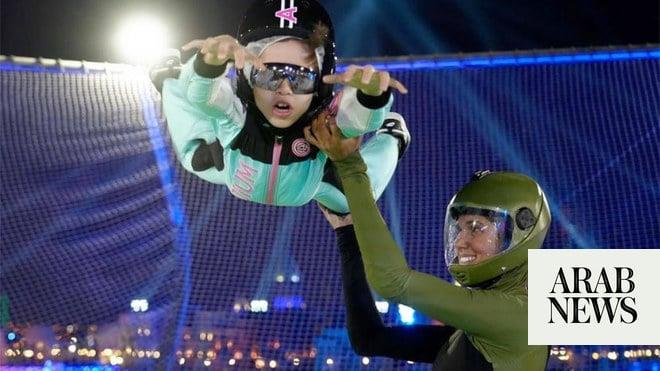
imone Biles became the central figure in a sporting parable last weekend, when she attempted, and landed, a move so dangerous that no other woman has ever even tried to do it in a gymnastics competition, not even the woman for whom it is named. Biles executed the Yurchenko double pike during the final night of the 2021 US Classic in Indianapolis; traditionally, it is only attempted by men. It was incredible. It defied belief, even as it unfolded before the crowd’s eyes.
If Ginger Rogers thought dancing backwards and in high heels was tough, then the sight of Biles approaching a vault blindly and then launching herself to astonishing heights, without so much as looking in the right direction, is something else entirely.
It may be obvious from the fact that I can only describe her moves as “very big”, “extremely high” and “that amazing jumpy-up spinny thing” that I don’t follow gymnastics religiously, nor do I fully understand its rules and regulations. But I do know that Biles, one of the the most decorated gymnasts ever, is a rock star of sport and has superhuman abilities that have made her famous across the globe. I have played the video of the Yurchenko double pike again and again, the one in slow motion, and the sheer wonder of Biles making her body do something that the laws of physics suggest it should not be able to do is thrilling.
Biles seemed thrilled herself. “I’m sorry but I can’t believe I competed a double pike on vault,” she tweeted afterwards, of her history-making achievement. But the judges gave it comparatively low marks, because dangerous moves have a lower starting point. The New York Times suggested that this might be to discourage less able athletes from attempting it, but to this outsider, at least, it seems to penalise the most exceptional athletes for being able to do the most exceptional things. Biles said that her scores were “too low”. “But they don’t want the field to be too far apart. And that’s just something that’s on them. That’s not on me,” she said, wisely.
Even so, she said that despite being under-rewarded, she would continue to attempt these dangerous moves. When asked why, she replied: “Because I can.” It went viral, because it struck a chord. Few can relate to Biles’s world-class athleticism, of course, but plenty can relate to being told not to stand out, to fall back into line. “Because I can” is a statement of defiance dressed up in a shrug and, like the woman who said it, it is inspirational.
James Newman: Eurovision revision needed
This year’s Eurovision song contest was fabulously dramatic, even by Eurovision standards. A drug-taking “scandal” that turned out to have been conscientious cleaning-up! Amanda Holden going the full Brits abroad on languages other than English! The indignity of not one but two nul points lobbed squarely at the UK by both the professional juries and the audience vote!
It was a post-lockdown rush of giddiness. Yet it does sting that we keep getting it so wrong. Poor old James Newman even got a commiserating phone call from Chris Martin afterwards, though hasn’t he suffered enough, etc, etc?
Bill Bailey appeared on Good Morning Britain to mop up the aftermath, telling Susanna Reid that he once submitted a song, but had it rejected by the BBC for being “too silly”. One could argue that in a competition once won by a woman doing an impression of a chicken, this not a useful measure of potential success, but the Eurovision alchemy is delicate: it’s not about daftness for the sake of it, but about taking it just seriously enough, no matter how outrageous the idea. To get past the nul lull, we need to find the right balance of sincerity and celebration.
Sharon Van Etten and Angel Olsen: singing along to a duet less ordinary
Two of my favourite singer-songwriters, Sharon Van Etten and Angel Olsen, have teamed up to release a new single, Like I Used To, a sweeping epic with all the swagger of an instant classic that I have attempted to sing along to in my car all week.
I love same-sex duets, not least because it means I can make an unholy mess of noise by belting out both parts, equally as terribly. Like I Used To has been a blessing to my ears and a curse to the ears of anyone I have driven past.
I love such duets, but outside of musical theatre, there are fewer of them than male-female ones. I think it makes them sound less familiar to our ears and they conjure up a different flavour of magic. But this is a minor genre stuffed with classics.
There is Brandy and Monica duking it out for the affections of a man who is surely not worthy of either their affections in The Boy Is Mine, or Miranda Lambert and Carrie Underwood partnering up to hit the town like a “real life Thelma and Louise” in Somethin’ Bad, or the beautiful, consolatory tones of I Used to Love Him, in which Mary J Blige seems to counsel a heartbroken Lauryn Hill on the perils of choosing “the road of passion and pain”, from the point of view of someone who has been there and done that many times before.
These songs stand out, because they offer a perspective away from the usual pop sentiments of “I’m in love” or “I’m at a party” or “I’m sad”. Like I Used To is a worthy addition to the canon.












